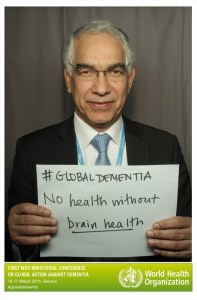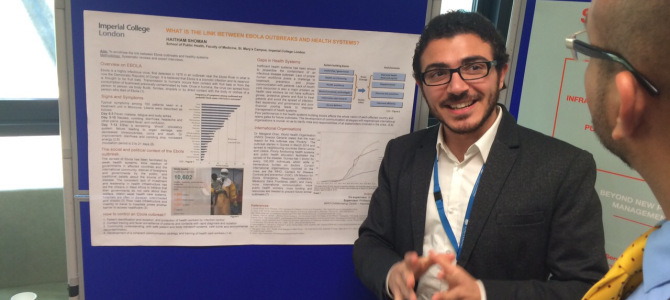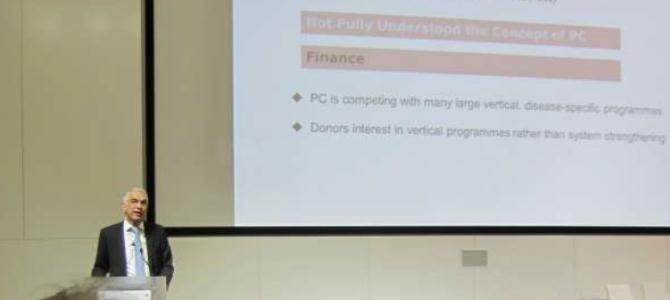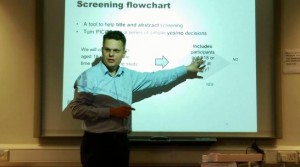The Visit to Jabir Ibn Hayyan University in Najaf, Iraq
Professor Ali Mahmood Al-Shimmeri, the President of Jabir ibn Hayyan welcomed Professor Salman Rawaf, Director of P WHO Collaborating Centre for public Health Education and Training, Imperial College London on Wednesday 1st of April, 2015 at Jabir Ibn Hayyan University.
Jabir ibn Hayyan Medical University is one of the first specialized Universities in Najaf, Iraq. It encompasses all kinds of medical sciences. The Faculty of Medicine was established at the beginning of the academic year 2013-2014 involving 86 students who were centrally admitted, transferred or hosted from other universities. It is planned for the University to involve four faculties: Medicine, Dentistry, Pharmacy and Nursing in addition to a large university hospital and many other medical and research centres in various fields of medicine. The aim of the visit was to discuss the Hopeful Role of the Imperial College in Reviewing and Upgrading the Curriculum of the Faculty of Medicine to Meet the Highest Quality Standards. Professor Rawaf pledged to help and promised to exert his faithful efforts in order to achieve this mission.
First Who Ministerial Conference On Global Action Against Dementia
 On 16 and 17 March 2015, WHO was hosting its first Ministerial Conference on Global Action Against Dementia. Ministers from around the world, as well as experts from the research, clinical and NGO communities, came together in Geneva for the first time to discuss the global problems posed by dementia.
On 16 and 17 March 2015, WHO was hosting its first Ministerial Conference on Global Action Against Dementia. Ministers from around the world, as well as experts from the research, clinical and NGO communities, came together in Geneva for the first time to discuss the global problems posed by dementia.
The aim of the conference was to raise awareness of the socio-economic burden created by dementia, and to highlight that this burden can be reduced if the world collectively commits to placing dementia high on the global public health agenda.
The first day of the conference covered issues from research and drug regulation to care and human rights. On the second day, ministers discussed how to collectively move the global dementia agenda forward.
The conference was supported by the Department of Health of the United Kingdom of Great Britain and Northern Ireland, and the Organization for Economic Cooperation and Development (OECD).
The full meeting was webcast in Arabic, Chinese, English, French, Russian and Spanish.
Celebrating Primary Care Achievements: Seeing the person behind the patient
Imperial College London and the International College of Person-Centred Medicine are pleased to announce the 1st International Conference of Primary Care and Public Health to celebrate Primary Care and Public Health Achievements.
Baroness Ilora Finlay, Baroness Sheila Hollins and Sir Al Aynsley Green are amongst the World and UK leaders in Primary Care and Public Health who will be leading the conference.
The five central themes are: Primary Care in the 21st Century, Ageing and Ageism, Children and Adolescents, Integrated Care, and Public Health in Primary Care. Discussions will cut across the four major disciplines of education, training, research and clinical practice.
The conference will be held at Imperial College London, South Kensington Campus, from 29 to 31 October 2015.
Tickets can be purchased through our website and abstracts can be submitted by July 1 by emailing g.greenfield@imperial.ac.uk
Please visit the conference website for more information
RCGP Global Health Family Medicine: Global Impact Conference London
Professor Salman Rawaf, Director of Who Collaborating Centre for Public Health Education and Training gave a presentation at the Conference organised by the Royal College of General Practitioners. The presentation: “A family physician for every person in the world: why we are failing globally” stressed that after thirty years of Alma Ata, the WHO World Health Report: Primary care – now more than ever, in 2008 re-focused the attention on the need of developing and strengthening primary care around the world. However, achievements since then are limited to patchy examples.
The talk also addressed the question why countries are reluctant or unable to develop their health system through primary care where every citizen has access to fully trained doctors who take care of health and healthcare needs. The number of trained family physicians needed in one of the WHO regions is projected to illustrate the magnitude of the tasks involved in developing primary care services that achieve the goal of universal health coverage. Guidance and suggestions for policy and decision-makers, health professionals, and civil society institutions will be offered, with the aim of maintaining and improving health to the highest of standards through effective primary care services.
Palestinian Family Medicine Visit to UK
The Department of Primary Care and Public Health (PCPH) at Imperial College London recently hosted a Palestinian Family Medicine delegation during their 4-day visit to the UK (4-8th March 2015). The visit was organised by the International Development of Family Medicine in Palestine (IDFMP), which is a collaborative initiative by UK GP academics. The aim of the visit was to orientate delegates to UK general practice and participate in the first RCGP Global Health ‘Family medicine: global impact’ conference in order to foster the development of a shared vision of family medicine training in Palestine. The delegates met Professor Salman Rawaf, Director of the WHO Collaborating Centre for Public Health Education and Training and there was lively discussion about shaping and developing family medicine in Palestine.
WHO CC work showcase at the Urology department educational seminar, 13 May 2015
At the request of Dr Alexandra Zachou — consultant urologist Imperial College Trust, Dr Sondus Hassounah, delivered a presentation at the Urology Department afternoon educational seminar showcasing the work the WHO CC undertakes. The presentation provided a brief overview of how the WHO CC was established and highlighted some of the projects the centre has been involved in since its designation by the WHO, with the support of the British Government, in 2007. The request to deliver this session stemmed from the urology departments’ interest in global health work and keenness to expose their faculty, staff and students to the broad application of public health and health system strengthening in a global context.
Systematic Literature Review Course
On Thursday 30th April 2015, our PhD students and fellows attended a one-day course on Systematic Reviews, given by Dr Holger Kunz. Through highly interactive and practical sessions, they learnt about why systematic literature reviews are so important in Public Health, how to develop a research question and a protocol, and the steps in conducting a systematic review – from literature search to selection of studies, quality appraisal, data extraction, meta-analysis and textual synthesis.
MPH student presentation at the Chevening Conference
 What is the link between Ebola outbreaks and Health Systems?
What is the link between Ebola outbreaks and Health Systems?
This is a question which needs to be asked in order to understand how this virus came to find its way around the globe in a matter of months. This topic must be scrutinised and assessed to help draft future recommendations for bridging current gaps in the health systems of vulnerable countries and eliminate the emergence of future outbreaks.
Dr. Haitham Shoman, who is studying his Master’s in Public Health at Imperial College London, prepared a poster on this subject and presented an overview at the Chevening Conference in Durham University on Diplomacy in the 21st Century that took place in Durham on the April 17th 2015. This was a fantastic opportunity to present such a cutting edge topic and educate high profile delegates, particularly those from non-medical backgrounds. His presentation drew a great deal of interest and questions from different participants. Support was given from Imperial College WHO CC. The dissertation he will be carrying out this summer, to be supervised by Professor Salman Rawaf, is centred on finding the link and grasping the roots of the problem, assessing information from a wide range of sources and reaching conclusions on how to mitigate such problems. A particular sense of urgency surrounds the spread of such diseases due to their potential to perpetuate poor health, poverty and inequality in some of the world’s most deprived countries. Living in the 21st century with globalisation and increased connectivity, countries with weak health systems should not be left behind as health is a fundamental human right and not exclusive to those living in the developed world. Strong health systems need to be established with proper communication and partnerships to avoid the progress of Ebola and avoid the emergence of new outbreaks.
Ela Augustyniak
WHO Collaborating Centre


